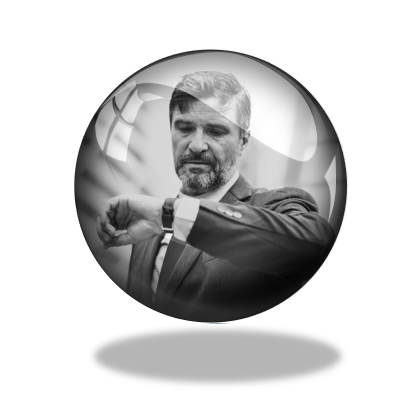 by Juergen Maier and Mike Clargo
by Juergen Maier and Mike Clargo
We have all gotten so busy. And it seems that, the more senior our role, the busier we are. We recently heard a story of a chief executive who wanted to access some expertise in some important areas of common interest. It took weeks to find space in his diary to make the call, and in the end it took place as he rushed through an airport dragging his carry-on between gates, for a flight he was in danger of missing.
We wonder how much of the potential benefit of such phone calls make it through to our eventual decisions?

But this situation is far from unusual; we might even have been that CEO rushing through the Airport whilst taking important calls. As we try to cope with the increasing levels of change and complexity that attends our roles, we find that so much more is forced into our calendars, and we are getting less and less time to properly understand and think things through.
Our strategies for how our organisations cope with change are more important than ever, but we lack the time to bring the best of ourselves to making them. And as we seek to embrace ideas like Agile, we find that the biggest delays arise in finding gaps in people’s diaries.
if the next free slot in your calendar is three weeks away – is that Agile?
Many of us ended up in the leadership of our organisations because we are good at making decisions. We are good at understanding the wider situation, thinking through the implications, and engaging others to move it forward. And, as everything changes around us, and complexity brings in ever more information to us, that quality of thinking is key to ensuring our organisation’s success. But how much of that quality do we still get to apply?
So the question we have to ask you is, if you take your own current trends in increasing pressure, and reducing time to deal with it, how will that look for you in three years’ time?

What sort of person will be needed to replace you to cope with 2025? And will their qualities be the ones that will be most effective in lifting the organisation to the next level? Or will they simply be the qualities that enable them to barely survive relentless onslaught of calls for their attention?
The reality is we cannot carry on like this. Yes, there are some people who thrive in these situations, but are they the best leaders for the future of the business? And what does restricting our pool of viable candidates to such people do for diversity? Are we excluding calmer, more reflective, more analytical, strategic, and creative minds from all the senior positions in our organisations? Or deterring those people who make a choice to not regularly let their loved ones, family and friends down for the pressures faced at work? And even if they do make it through, are we getting the best out of those minds under the pressures that are becoming the norm? And what about the ever-rising issues of mental health in the workplace?
busyness suppresses diversity
The situation clearly has to change, and the quicker it changes the better it will be for all of us and society.
Let’s face it, we really don’t want to carry on like this. It may be a buzz for a while. But are we proud of the legacy we are putting into place? Or are we simply proud of clinging on to the title and status in impossible circumstances?
So how do we change it?
We believe that there are three things we need to do.
1: Call it as it is

First, we need to call it as it is. We need to be honest about what is happening and its potential implications for us, our people, our organisations, and our values. We need to move beyond the ‘macho’ front that exists, and open up about the downsides of all this. Yes, that requires courage, but we needed courage to get where we are. We have courage. And it is now time to turn it to a different track. To step into the adventure of: What happens if we stand up, and say “This has to stop!”
2: Carve out time
Second, we need to
carve out time for ourselves to really think about what is going on. We need to put a regular meeting in with ourselves. To prioritise it in our calendars. To ensure it never gets squeezed out, or taken over by something else – not even personal things. Ideally this will be a whole day every week. We may think that is impossible, but if it was about something organisationally or medically vital, we would put it in. And this is organisationally vital (and possibly even medically vital too).
3: Make ruthless decisions
Third, we work out how to use this day to address the busyness issue. We define clearly the key differences we personally want to impact on our organisation – the legacy we want to leave – a set of 3-4 very key goals and changes that you will personally pursue to ensure the organisation’s future success. And we lay out what is currently consuming our time, and where they impact those goals. Then we ruthlessly target anything that is not contributing efficiently. We allocate a budget of time for it, based on its contribution, and we work out what we have to do differently to meet that budget.
And the rest is enacting the decisions that arise from step 3.
And what of the day a week that got us to this point? We maintain that a day a week is always
a good investment for someone to be seriously ‘just thinking’ about the organisation and how it is developing. Somebody needs to be doing it. And we are probably the best placed to ensure it happens.
Related links
About the authors
Juergen Maier CBE
Juergen Maier is Chair of the Digital Catapult, co-founder of vocL – a platform for responsible business voices, former Chief Executive of Siemens UK, and is Vice-Chair of the Northern Powerhouse Partnership where he supports the drive for the green re-industrialisation of the North of England. He is an industrialist and business commentator.
Mike Clargo
Mike Clargo has over 30 years of experience and innovation in strategy engagement. Helping internationally recognised clients develop exciting visions and engaging their organisations’ passion and creativity in pursuit of that. He is a pioneer in using design thinking and engagement frameworks to develop agile strategies.
 by Juergen Maier and Mike Clargo
by Juergen Maier and Mike Clargo But this situation is far from unusual; we might even have been that CEO rushing through the Airport whilst taking important calls. As we try to cope with the increasing levels of change and complexity that attends our roles, we find that so much more is forced into our calendars, and we are getting less and less time to properly understand and think things through.
But this situation is far from unusual; we might even have been that CEO rushing through the Airport whilst taking important calls. As we try to cope with the increasing levels of change and complexity that attends our roles, we find that so much more is forced into our calendars, and we are getting less and less time to properly understand and think things through. What sort of person will be needed to replace you to cope with 2025? And will their qualities be the ones that will be most effective in lifting the organisation to the next level? Or will they simply be the qualities that enable them to barely survive relentless onslaught of calls for their attention?
What sort of person will be needed to replace you to cope with 2025? And will their qualities be the ones that will be most effective in lifting the organisation to the next level? Or will they simply be the qualities that enable them to barely survive relentless onslaught of calls for their attention? First, we need to call it as it is. We need to be honest about what is happening and its potential implications for us, our people, our organisations, and our values. We need to move beyond the ‘macho’ front that exists, and open up about the downsides of all this. Yes, that requires courage, but we needed courage to get where we are. We have courage. And it is now time to turn it to a different track. To step into the adventure of: What happens if we stand up, and say “This has to stop!”
First, we need to call it as it is. We need to be honest about what is happening and its potential implications for us, our people, our organisations, and our values. We need to move beyond the ‘macho’ front that exists, and open up about the downsides of all this. Yes, that requires courage, but we needed courage to get where we are. We have courage. And it is now time to turn it to a different track. To step into the adventure of: What happens if we stand up, and say “This has to stop!”









